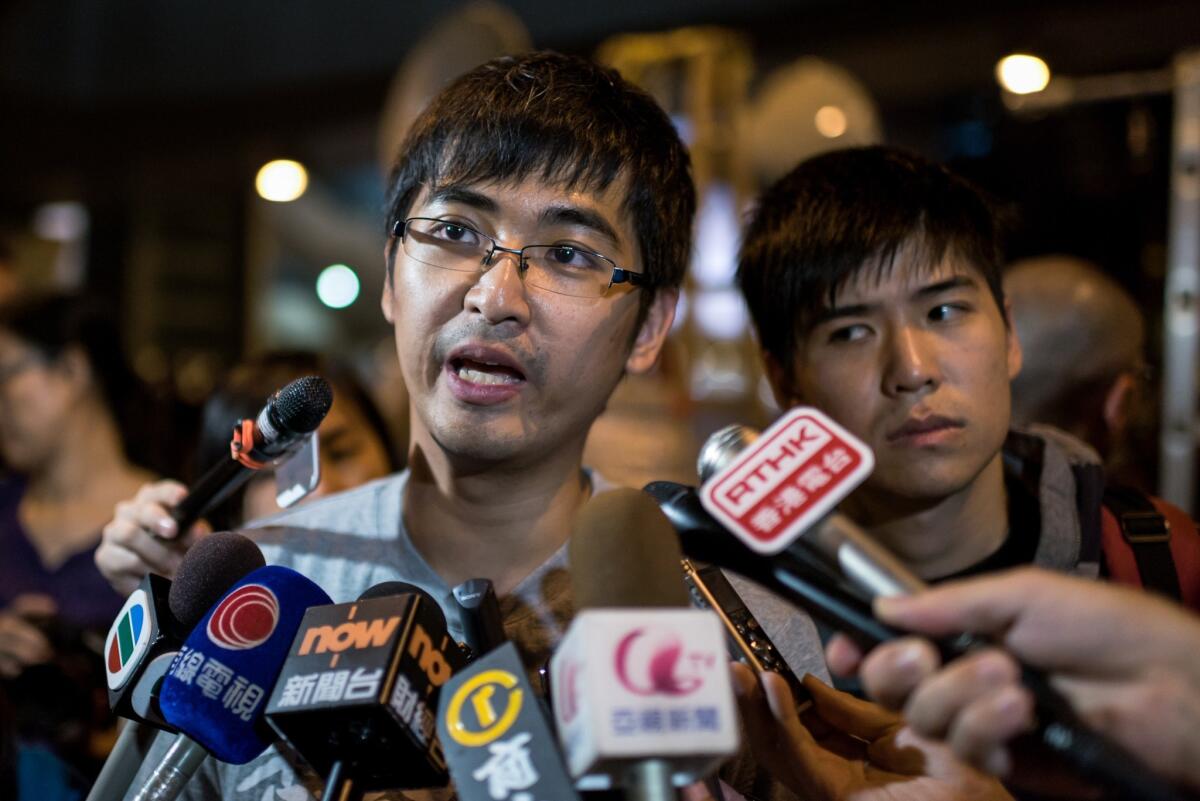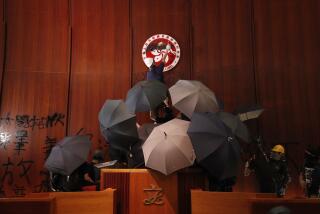Hong Kong protest leader: New strategies needed to pressure government

Hong Kong’s pro-democracy movement will need to muster more political power to force the government to listen to its demands, said Alex Chow, one of the student leaders of the demonstrations, as the sit-ins stretched on Wednesday.
“We will need to further justify our actions and rethink the strategy of [just] calling on more people to occupy the streets,” said Chow, leader of the Hong Kong Federation of Students. “If occupying the streets [alone] could force the government to back down, they already would have.”
Chow said protest organizers are now “thinking out how to regroup [and get] that many protesters back to the streets,” while at the same time figuring out “how to bring the campaign from street to the community, and mobilize more power from Hong Kong people to force the government to change.”
Protesters in Hong Kong, a former British territory that returned to Chinese rule in 1997 under a framework known as “one country, two systems,” took to the streets late last month to demand open nominations of candidates for the chief executive election in 2017. China’s central government in Beijing has rejected such a framework, insisting that all candidates must be approved by a special committee.
Five government officials met Tuesday with student leaders in the first of what is expected to be several rounds of talks aimed at resolving the political crisis. But the session did little to raise hope that a resolution was close at hand.
In an interview with The Times after the talks, Chow, 24, expressed disappointment about the dialogue and discussed what is next for the campaign.
“What the officials were willing to offer was even less than what we expected,” he said. “No one knew what they are actually talking about. They said they would submit a report to Beijing and consider setting up a platform to supervise constitutional development, but there were no details, no timeline, nothing.”
Chow said that although the Hong Kong government could reject the Aug. 31 decision by the Chinese National People’s Congress to require strict screening of candidates for the next Hong Kong chief executive, the reality is that Hong Kong officials wouldn’t dare do that, at least not yet.
To change that, Chow said, “more political power is needed.” How Chow plans to accomplish that, however, remains to be seen.
“The real battle right now is not confronting or negotiating with the government; it is a battle of two strengths,” he said. “It is about if we have enough political power to force the other give in and give us more.”
Since the democracy movement kicked into high gear last month, Chow has rocketed to world attention as a standard-bearer of Hong Kong’s aspirational young generation.
Hailing from a middle-class family, Chow is working on a double major in comparative literature and sociology at Hong Kong University. He was only elected to be secretary-general of the Hong Kong Federation of Students in April. He helped lead the student strike that snowballed into what’s now being called the Umbrella Revolution.
Though the protests are in some ways leaderless, Chow has emerged as the de facto figurehead and thus is at pains to keep his finger on the pulse of the movement.
“The campaign is no longer a student movement, but interestingly, many people still think this is,” said Chow. “Some people think the Federation of Students can represent them, and some do not.”
Leading the movement has been far more challenging than he had ever imagined, Chow said, and he is endeavoring to understand the developments in a larger historical arc.
“Over the past 30 years, Hong Kong has attempted to gain democracy through negotiations, but these efforts are ineffective against the Beijing authorities,” said Chow, rejecting suggestions that the movement has become “too radical” and is doing more harm than good to Hong Kong society. “Hong Kong needs to be changed, and we have to come forward to make that happen.”
Each day has brought new difficulties, including violent clashes between protesters and police, divided sentiments among demonstrators on what they want to achieve, and growing pressure from residents and businesses affected by the protests.
In a poll by the Chinese University of Hong Kong released Wednesday, 38% of 802 Hong Kong citizens said they support the protests while 35% said they do not. But in bad news for the Hong Kong government, a bigger group – 48% -- said they oppose the voting framework laid out by the National People’s Congress standing committee.
Although the nomination screening requirement remains unpopular, the poll showed that 55% of people support the idea of trying to make the nominating committee more representative, or “democratizing” it.
Chow said the student group initially failed to mobilize a wide swath of Hong Kongers to support the democracy campaign. But the demonstrations gained momentum when many locals, angered by police use of tear gas against protesters on Sept. 28, headed to the streets.
The biggest challenge right now, Chow said, is to provide a possible blueprint for political reform that most Hong Kong people would accept, and therefore press the campaign forward.
Addressing thousands of protesters at Admiralty after Tuesday’s talks, Chow made it clear that he has no intention of throwing in the towel anytime soon – and encouraged protesters to stick to their positions.
Chow said people will not easily leave the street without real offers from the government’s side. But even if the protesters gradually disperse from the streets, he said, the movement has changed the mindset of a whole generation.
Hong Kong’s relationship with Beijing will definitely change after the movement, Chow predicted. “Hong Kong has already taken a big step forward,” he said. “Instead of thinking we are too weak to confront the central government, the younger generation will now stand up against it to fight for the political rights we deserve.”
Hui is a special correspondent. Times staff writer Julie Makinen in Beijing contributed to this report.
Follow @JulieMakLAT on Twitter for news out of Hong Kong
More to Read
Sign up for Essential California
The most important California stories and recommendations in your inbox every morning.
You may occasionally receive promotional content from the Los Angeles Times.










